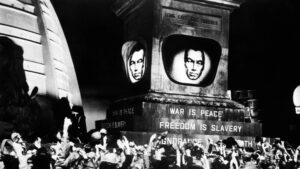
“Propaganda does not deceive people; it merely helps them deceive themselves.”
Have you ever felt like you’re being nudged towards certain opinions or actions without even realising it? Well, you might just be another target of modern propaganda.
From its early beginnings, propaganda has advanced significantly. It is no longer just a technique used by governments during times of conflict or election campaigns; it is now present in every aspect of our everyday life. There is no denying that modern propaganda has an impact on society, influencing attitudes, actions, and even our perceptions in subtle but significant ways. The strength of modern propaganda has found a strong ally in the world of tweets, likes, and shares. A power that today penetrates our internet relationships originally existed only in posters and radio broadcasts. The effect of modern propaganda on society, particularly through social media, is both far-reaching and transformative.
The era of blatant propaganda with clear objectives is over. Today’s propaganda hides behind our relatability, blending into our daily scroll through social media platforms. It is subtle and disguising, passing for related information, memes, and even viral challenges. This manipulation often blurs the line between fact and fiction, allowing information to enter our consciousness without setting off any alarms.
Social media platforms have ingrained themselves deeply into our lives in the era of digital connection. They give us a platform to connect, communicate, and express ourselves. But beneath the surface of these seemingly innocent platforms lies a strong force that has the ability to influence our beliefs, actions, and even entire societies. Social media has become the latest playground for modern propaganda.
In addition, Social media acts as an amplifier to the echo chamber effect. The echo chamber effect, in which people are only recommended material that supports their likes, has been made worse by the algorithms of social media sites. At the heart of modern propaganda’s effectiveness lies its mastery of emotional manipulation. Social media platforms are ideal channels for delivering content that triggers emotions. These algorithms choose the content we see based on our previous interactions, unintentionally isolating us in cliques of like-minded people.
Who needs facts when you’ve got catchy slogans and graphics?
(Source: The New Yorker)
By appealing to these biases, propagandists can influence people to accept information without giving it a second thought.
Propaganda is now associated with misinformation through social media. With the help of likes, shares, and retweets, fake narratives and stories can spread like wildfire. Modern propaganda takes advantage of this viral quality by preying on people’s ability to share emotionally charged news without checking its legitimacy. Because of this, false information spreads across society, shifting everyone’s perception of reality.
The irony is that social media, which was supposed to bring people together, has instead deepened societal divides. Modern propaganda strengthens the division between users by providing users with content that validates their preexisting opinions. Due to a toxic feedback loop where people grow less open to connecting with different viewpoints, this situation is made worse by the algorithmic structure of these platforms.
Because it avoids the complexity that topics frequently possess and instead presents them in black-and-white, propaganda usually succeeds this way. The reduction of concepts stifles thinking and makes it easier for society to believe. Individuals may be more inclined to accept information at face value, leading to a decline in media literacy.
These days anyone can share content which calls into question the legitimacy of information that is true. The rise of modern propaganda on social media has also given birth to the “post-truth” era, where emotions and personal beliefs often outweigh objective facts.
Modern propaganda positions itself as an alternative in an effort to weaken belief in trusted sources of information. In a culture where misinformation undermines reality, trust in certified institutions can also degrade.
(Source: Sergio Ingravelle via Irancartoon)
The basic tenet of modern propaganda is that the public is more inclined to trust a message the more times they hear it. Repetition is key to installing an idea in our minds. With their constant content updates, social media platforms provide ample opportunities for propagandists to reinforce their plans.
Alteration of pictures and videos has increased, making it difficult to distinguish between real and modified material. This visual trickery can circulate propaganda more quickly.
Fake accounts and bots are used to artificially boost some messages and create the impression of widespread support. This fake popularity has the power to distort reality and influence public opinion.
Propaganda affects not only beliefs but also actions. Advertisers have recognised the persuasive power of this, and now that they have access to a wealth of data, they are able to design highly targeted ads that appeal to our irrational fears and desires. This may cause us to make decisions that support their goals without even realising it.
Even if we live in a time of modern, stern propaganda, we are not helpless. To successfully navigate the effects of this, practical thinking abilities must be developed. To avoid falling into the echo chamber trap, it is always better to examine the information’s sources, double-check assertions, and look through different points of view.
While individuals play a big part in limiting the effects of propaganda, social media platforms also bear some of the blame. Platforms must take important steps to stop disinformation, such as algorithm transparency, content filtering, and misinformation countermeasures. Users can be informed to make wise judgements by being warned about the possible influence of propaganda and given the means to confirm facts.
In conclusion, modern propaganda has a wide-ranging and complex impact on society. It influences our behaviour, shapes our views, and even calls into question what is true.
A new era of challenges for preserving an informed and cohesive society is necessary. While these platforms allow never-before-seen levels of communication and involvement, they also serve as a breeding ground for false information and echo chambers. It is essential to equip each other with media literacy skills, foster critical thinking, and promote more transparent algorithms as we navigate this complex environment. We can only expect to counteract the adverse effects of propaganda and cultivate a more educated and peaceful society by fostering a digital environment where truth prevails. The power to counter its influence lies in our hands. In a world where our screens wield tremendous power, our ability to think remains our greatest asset.
Written by Madhu Gowda for MTTN
Edited by Agnes Chiramal for MTTN
Featured image via Pinterest


Leave a Reply
You must be logged in to post a comment.